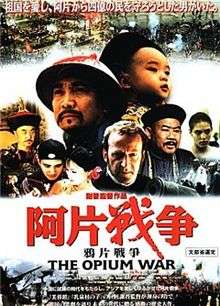The Opium War (film)
The Opium War (鸦片战争) is a 1997 Chinese historical epic film directed by Xie Jin. The winner of the 1997 Golden Rooster and 1998 Hundred Flowers Awards for Best Picture, the film was screened in several international film festivals, notably Cannes and Montreal. The film tells the story of the First Opium War of 1839–1842, which was fought between the Qing Empire of China and the British Empire, from the perspectives of key figures such as the Chinese viceroy Lin Zexu and the British naval diplomat Charles Elliot.
| The Opium War | |
|---|---|
 Japanese film poster | |
| Traditional | 鴉片戰爭 |
| Simplified | 鸦片战争 |
| Mandarin | Yāpiàn Zhànzhēng |
| Directed by | Xie Jin |
| Produced by | Chen Zhigu |
| Written by | Zhu Sujin Ni Zhen Zong Fuxian Mai Tianshu |
| Starring | Bao Guo'an Lin Liankun Sihung Lung Bob Peck Simon Williams Shao Hsin Su Min |
| Music by | Jin Fuzai Huang Hanqi |
| Cinematography | Hou Yong Shang Yong |
| Edited by | David Wu Qian Lili Zhang Longgen |
Production company | Emei Film Studio Xie Jin / Heng Tong Film & TV Co. |
| Distributed by | Golden Harvest Mandarin Films (International) Co. Ltd. |
Release date |
|
Running time | 150 minutes |
| Country | China |
| Language | Mandarin English |
Unlike many of its contemporaries, The Opium War was strongly supported by the state apparatus.[1] Despite its clear political message, many Western commentators found the treatment of the historical events to be generally even-handed.[2]
At the time of its release, The Opium War, with a budget of $15 million (USD), was the most expensive film produced in China.[3] It was released to coincide with the Hong Kong handover ceremony in July 1997.
Plot
Cast
- Bao Guo'an as Lin Zexu
- Lin Liankun as Qishan
- Sihung Lung as He Jingrong
- Shao Hsin as He Shanzi
- Bob Peck as Denton (based on Lancelot Dent)
- Simon Williams as Charles Elliot
- Su Min as the Daoguang Emperor
- Jiang Hua as Guan Tianpei
- Li Shilong as Han Zhaoqing
- Li Weixin as Deng Tingzhen
- Gao Yuan as Rong'er
- Emma Griffiths as Mary Denton
- Philip Jackson as Captain White
- Garrick Hagon as Sidon Laughton
- Robert Freeman as Hill
- Denis Lill as Lord Eversley
- Corin Redgrave as Lord Melbourne
- Debra Beaumont as Queen Victoria
- Benjamin Whitrow as Lord Palmerston
- Oliver Cotton as James Bremer
- Zhou Chuanyi as Yiliang
- Ko Hsiang-ting as Yishan
- Liu Zhongyuan as Lü Zifang
- Shi Yang as Lin Sheng
- Gu Lan as senior minister
- Kong Xianzhu as He Rengui
- Chang Xueren as San
- Li Shaoxiong as Yao Huaixiang
- Yang Heping as military officer
- Yang Zhaoquan as blind musician
- Wang Fen as Qiuping
- Liang Yang as Baihe
- He Qingqing as Lanrui
- Zhang Wanwen as brothel owner
- James Innes-Smith as Prince Albert
- Edward Petherbridge as British Member of Parliament
- Dominic Jephcott as British Member of Parliament
- Tony Rushforth as British Member of Parliament
- Jamie Wilson (uncredited) as Paul Artuard
- Nigel Davenport (uncredited)
Production
The film was shot in the Hengdian World Studios in Zhejiang province, a common filming site for historical films which has been dubbed "Chinawood." In order to recreate the streets of 19th-century Guangzhou, nearly 120 construction teams from surrounding villages were assembled.[4] In contrast, nearly all post-production took place in Japan.[5]
Reception
Despite its clear political background (and its release on the eve of the return of Hong Kong to China), the film was generally well received by Western critics as a workable example of the big-budget historical film. Variety, in one review, begins with the fact that despite the film's "unashamedly political message," The Opium War was nevertheless "comparatively even-handed," while the film itself had excellent production values.[5] The Guardian recognised that the film, despite its official backing, "was relatively nuanced," and praised the performance of Bob Peck as the venal opium trader Denton.[6]
The film's domestic release was also positive, with The Opium War eventually winning the Golden Rooster for Best Film.
References
- "Xie Jin Speaks Out". Filmfestivals.com. Retrieved 2007-12-11.
- Elley, Derek (1997-06-08). "The Opium War". Variety. Retrieved 2007-12-12. Higgins, Andrew (1997-06-12). "China's Epic Exorcism". The Guardian. Retrieved 2007-12-12.
- Gee, Alison Dakota (1997-06-27). "Xie's Epic Victory, A historical spectacle surprises the cynics". AsiaWeek. Retrieved 2007-12-11.
- Zhang Wenting. "Xu Wenrong and His "Chinawood"". China Today. Retrieved 2007-12-13.
- Elley, Derek (1997-06-08). "The Opium War". Variety. Retrieved 2007-12-12.
- Higgins, Andrew (1997-06-12). "China's Epic Exorcism". The Guardian. Retrieved 2007-12-12.
External links
- The Opium War on IMDb
- The Opium War at AllMovie
- The Opium War at the Hong Kong Movie DataBase
- The Opium War at the Chinese Movie Database